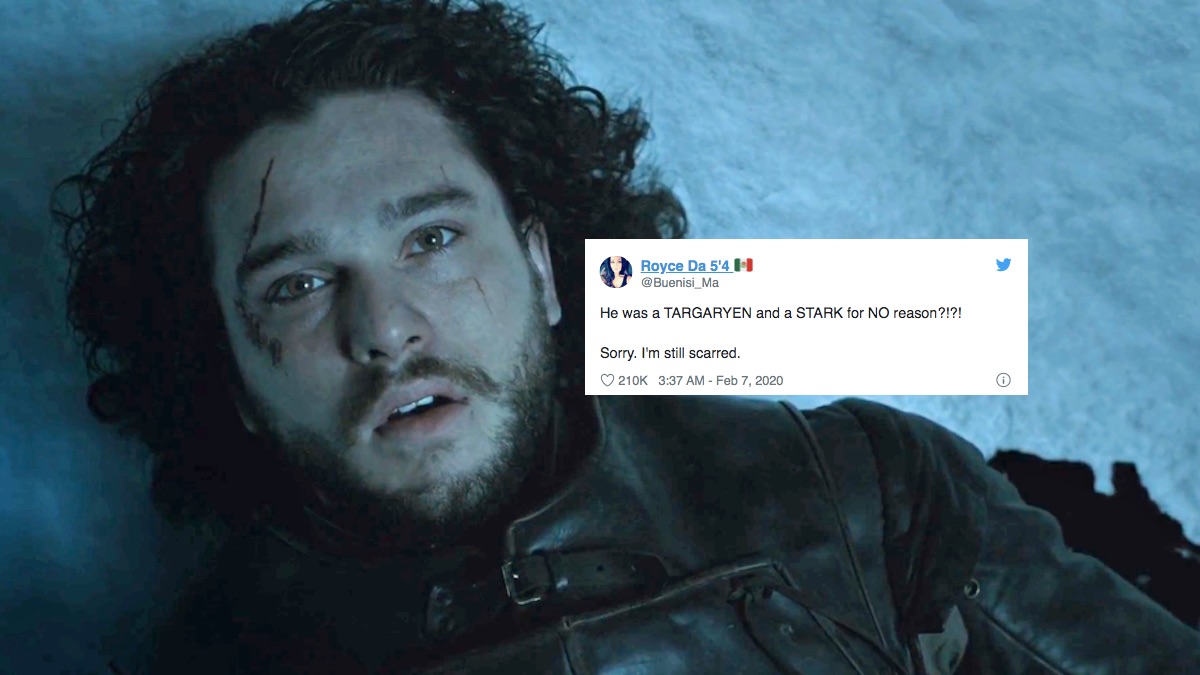Sometimes your brain just flashes back to the end of Game of Thrones, and pipes up: really? Really?
Last week on Twitter, user @Buenisi_Ma sent out a simple Tweet that did not name Game of Thrones or even the character that she was thinking about, yet it clearly struck a nerve. People knew instantly what she was referencing, and felt her pain.
He was a TARGARYEN and a STARK for NO reason?!?!
Sorry. I’m still scarred.
— Royce Da 5’4 (@Buenisi_Ma) February 7, 2020
With more than more than 200k likes, it’s clear that there’s still widespread dissatisfaction with how a major plot element came to fruition on the HBO show.
The parentage of Jon Snow (Kit Harrington) was treated as a big deal throughout the series (and in the books), which makes sense considering he was born from the secret union of a Targaryen and a Stark, two of the powerful families in conflict and vying for, well, the Throne in question. Jon was the son of Lyanna Stark (Ned’s sister) and Rhaegar Targaryen (Daenerys’ brother), but was raised as Ned Stark’s illegitimate son in order to conceal his true identity. Naturally, considering that this was a secret so massive and so closely guarded that Ned let his wife think he’d fathered a bastard rather than tell her the truth, it was assumed that it would be a vital pivot for the plot in the end. But as it turned out … not so much?
Other folks on Twitter tried to grapple with their emotions concerning Jon as well as other plot elements that had been built up for years and then seemed to fizzle out on the show, like Arya’s face-swapping or Bran’s warg-ing.
All I’m saying is… Arya should’ve been able to kill Cersei wearing Jamie’s face and Jon should’ve been able to kill the NK after 20 more episodes of important fleshed out plot points.
— Royce Da 5’4 (@Buenisi_Ma) February 9, 2020
Bran was a warg for NO reason
— ℜ (@rosaortegx) February 7, 2020
I’ll leave this here pic.twitter.com/zazyxmeA7x
— C o r i n n e (@MunroeTaylor) February 7, 2020
And this meant nothing… at all…. the disappointment still hurts. pic.twitter.com/Mn3ZdKPXC5
— matt (@mattybarra02) February 7, 2020
In terms of Jon, it wasn’t simply where he ended up, but how much he had to go through and overcome only to have an unsatisfactory end that still has people up in arms. This is not good storytelling.
Won her heart and her dragons, defeated the army of the dead, and for what?! To take a knife into Danny because she burned Kings Landing?! Jon being a Targaryen was only used to fuel Danny’s rage and isolation but then she asked him to rule w/ her in the end so I’m confused !!
— ~ Tavi ~ (@illxstmami) February 7, 2020
that show was like being offered a varied, multi-course meal with steak, lobster, dessert and rare wines only to find it’s all actually just colored water and tofu. ALL OF IT.
— T’Chillin (@madnuhrah) February 7, 2020
When we spend as long as we did with the characters on Game of Thrones, our level of investment in what happens to them becomes part of the fabric of our lives. Which is why it’s much harder to reconcile poor plotting or twists—you’ve spent so much time thinking and theorizing about it yourself, you know you would’ve done it differently, and it feels personal. And no one likes the feeling that they’ve been jerked around. It says something about the power of storytelling that discussing Game of Thrones’ missteps still provokes such passionate, visceral reaction—but more urgently, it points to the need for well-planned plots that tie up the threads we were weaving with for so long, rather than burning them off.
It’s entirely possible that if we ever get to read George R.R. Martin’s final A Song of Ice and Fire books, these same plot elements currently causing so much pain will make a lot more sense, as we may see them develop and be fleshed out and fully justified. Perhaps we’ll comprehend Daenerys’ fall after so long as a heroine. Perhaps we’ll understand Jon’s perspective in taking the actions that he did. Perhaps we can stop screaming about Bran becoming King. But on the show, we needed much more than what we were given.
It’s evident that we as a viewing community haven’t quite healed from this yet. Perhaps we never will, but hopefully some lessons have been learned about what not to do.
The night is dark and full of errors.
— Jeremy Maggi (@theOGMaggi) February 7, 2020
(via Twitter, image: HBO)
Want more stories like this? Become a subscriber and support the site!
—The Mary Sue has a strict comment policy that forbids, but is not limited to, personal insults toward anyone, hate speech, and trolling.—
Have a tip we should know? tips@themarysue.com




















![[Book Review] The Blade Itself (The First Law Trilogy) by Joe Abercrombie](https://bendthekneegot.com/wp-content/uploads/2018/01/1516047103_maxresdefault-218x150.jpg)

















